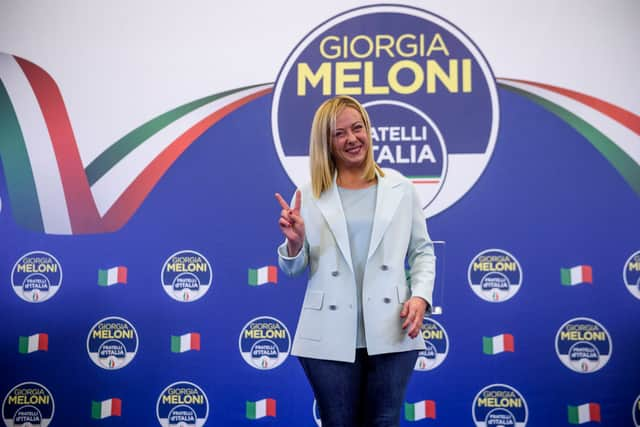Giorgia Meloni: who is Italy’s new Prime Minister, policies explained - why is she being compared to Mussolini
and live on Freeview channel 276
Far-right leader Giorgia Meloni is on course to become Italy’s first female Prime Minister, exit polls suggest.
An exit poll on state television shortly after polls closed on Sunday evening (25 September) suggested that Ms Meloni’s Brothers of Italy alliance with two right-wing parties was on track to take as much as 45% of the vote in both chambers of Parliament.
Advertisement
Hide AdAdvertisement
Hide AdHer closest contender, the centre-left alliance of former Democratic Party Premier Enrico Letta, is reportedly garnering as much as 29.5% of the vote. State broadcaster Rai said the exit poll had a margin of error of 3.5%.
It would see Ms Meloni, 45, become Italy’s first far-right Prime Minister since the end of World War Two, although she has since said her Brothers of Italy party would "govern for everyone" and would not betray people’s trust.
Her party would need to form a coalition with her main allies, anti-migrant League leader Matteo Salvini and conservative former premier Silvio Berlusconi to command a solid majority in Parliament.


Who is Giorgia Meloni?
Giorgia Meloni was born in Rome and moved to Garbatella in her teenage years. There, aged 15, she joined Youth Front, the youth wing of the neo-fascist MSI. She later became the president of the student branch of the movement’s successor, National Alliance.
Advertisement
Hide AdAdvertisement
Hide AdIn 2008, aged 31, Ms Meloni became Italy’s youngest ever minister, appointed to the Youth and Sport portfolio by Silvio Berlusconi. After forming her own party in 2012, she won just 4% of votes in the last election in 2018. She leads a party rooted in a post-war movement that rose out of dictator Benito Mussolini’s fascists.
Earlier this year she outlined her priorities in a raucous speech to Spain’s far-right Vox party: "Yes to the natural family, no to the LGBT lobby, yes to sexual identity, no to gender ideology... no to Islamist violence, yes to secure borders, no to mass migration... no to big international finance... no to the bureaucrats of Brussels!"
What are her policies?
Ms Meloni has solidly backed the supplying of Ukraine with arms to defend itself against Russia’s invasion. In contrast, right-wing League leader Matteo Salvini, has voiced concern that Western sanctions could end up hurting Italy’s economic interests more than punishing Russia’s.
Former premier Silvio Berlusconi, another long-time Putin admirer, has said that his inclusion in a centre-right bloc’s coalition would guarantee that Italy stays firmly anchored in the European Union and one of its most reliable members.
Advertisement
Hide AdAdvertisement
Hide AdWith Italy’s households and businesses struggling with high energy bills, Ms Meloni has opposed Mr Salvini’s push to swell already-debt-laden Italy by tens of billions of euros for energy relief.
Ms Meloni has criticised Europe’s “Brussels bureaucrats” and recently defended Hungary’s Prime Minister Viktor Orban after the European Commission recommended suspending billions of euros in funding to Hungary over concerns about democratic backsliding and the possible mismanagement of EU money.
However, after opinion polls in the run-up to the vote indicated she would be headed to victory, Ms Meloni started moderating her message of “God, homeland and family” in an apparent attempt to reassure the European Union and other international partners.
“This is the time for being responsible,” Ms Meloni said, appearing live on television and describing the situation for Italy and the European Union as “particularly complex”.
Advertisement
Hide AdAdvertisement
Hide AdIn her campaign, she criticised European Union officials as being overly bureaucratic and vowing to protect Italy’s national interests if they clash with EU policies.
Votes so far
Projections based on votes counted from nearly two-thirds of the polling stations in Sunday’s balloting indicated Ms Meloni’s Brothers of Italy party would win some 25.7% of the vote. That is compared to some 19.3% by her closest challenger, the centre-left Democratic Party of former premier Enrico Letta.
Ms Meloni’s meteoric rise in the European Union’s third-largest economy comes at a critical time, as much of the continent reels under soaring energy bills, a repercussion of the war in Ukraine, and the West’s resolve to stand united against Russian aggression is being tested. In the last election, in 2018, Ms Meloni’s party took 4.4%.
Nearly 64% of eligible voters deserted the ballot, according to the Interior Ministry. That is far lower than the previous record for low turnout, 73% in 2018.
Italy’s government since the last election
Advertisement
Hide AdAdvertisement
Hide AdItaly has had three coalition governments since the last election — each led by someone who had not run for office.
Italy’s complex electoral law rewards campaign alliance. Ms Meloni was buoyed by joining campaign forces with Mr Salvini and Mr Berlusconi.
The election on Sunday came six months early after Mr Draghi’s pandemic unity government, which enjoyed wide citizen popularity, collapsed in late July after the parties of Mr Salvini, Mr Berlusconi and Ms Conte withheld support in a confidence vote.
Ms Meloni kept her Brothers of Italy party in the opposition, refusing to join Mr Draghi’s unity government or the two previous coalitions led by Mr Conte.
Comment Guidelines
National World encourages reader discussion on our stories. User feedback, insights and back-and-forth exchanges add a rich layer of context to reporting. Please review our Community Guidelines before commenting.
